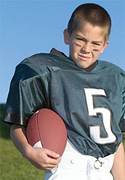Keeping Them Safe
By Kathryn Feather
Many parents proudly wear the mantle of "Soccer Mom" or "Football Dad." These tireless supporters spend their weekends chauffeuring kids back and forth between any number of team and individual sporting events. They invest countless hours in travel time and spend large portions of their paychecks on the necessities of maintaining this life. What many parents, as well as coaches, don't always think about is the time and money spent dealing with sports-related injuries.
Many kids today begin competing at an early age and some even have the ability to enter elite competition when their peers are just beginning to figure out how to survive junior high. For parents, this presents challenges on many levels, including physical, mental as well as emotional issues their kids might encounter as they develop their skills and dream of becoming professional athletes. No matter what their skill level, kids need parents who will monitor their workouts, help prepare meals to give them the nutrition they need to stay competitive and healthy, and be there for them emotionally when a game or meet doesn't go as planned.
Getting your kids involved in sports is a great way to teach them discipline, sportsmanship, honesty, perseverance and how to stay calm and collected in high-stress situations. Most kids won't win Olympic gold or sign pro contracts worth millions, but the following tips can help them become healthy competitors and keep injuries at bay.
Feeding Growing, Competitive Bodies
 Children and teenagers have unique nutritional needs as they continue to grow and develop. Those who are competitive athletes have to pay even closer attention to their diets in order to avoid injury and stay healthy and active. Child and teen athletes generally need more calories to not only fuel their athletic activities, but also fuel their growth. Depending on the level of activity, teenage athletes need between 2,000 and 5,000 calories per day to meet their energy and nutritional needs.
Children and teenagers have unique nutritional needs as they continue to grow and develop. Those who are competitive athletes have to pay even closer attention to their diets in order to avoid injury and stay healthy and active. Child and teen athletes generally need more calories to not only fuel their athletic activities, but also fuel their growth. Depending on the level of activity, teenage athletes need between 2,000 and 5,000 calories per day to meet their energy and nutritional needs.
If young athletes don't ingest enough calories, their bodies might not achieve peak performance. Extreme calorie restriction can lead to growth problems and other potentially serious health issues for both boys and girls. Dieting is generally not recommended for young athletes. Teenagers, especially, might have body image issues so working with a doctor or a psychologist is important to help them maintain a realistic and healthy outlook.
Eating disorders are a common problem for young women. Female athletes can develop some serious health issues if they combine strenuous athletic activity with improper nutrition resulting from an eating disorder. They can be at risk for a condition known as female athlete triad. This is a combination of three separate conditions: eating disorders (anything from avoiding certain foods to anorexia nervosa or bulimia nervosa), amenorrhea (a decrease in estrogen which results in an irregular menstrual cycle) and osteoporosis (a weakening of the bones due to the loss of bone density and improper bone formation). A young female athlete can suffer from one or all of these conditions.
Although most commonly thought of in female athletes, male athletes can suffer from eating disorders as well. Sports emphasizing weight include wrestling, swimming, track or gymnastics and those participating in these activities might feel pressure from coaches, parents or teammates to lose weight. It's important to work with a health professional to develop a plan that allows for weight loss when necessary, but also puts young bodies on a path to better health as well as better performance.
Experts advise eating a variety of foods including lean proteins, fats and carbohydrates to maintain energy levels on a consistent basis. It's also important for young athletes to get the right combinations of vitamins and minerals. Strong bones will help reduce the potential for stress fractures so calcium is an essential component, in addition to iron which carries oxygen to hardworking and developing muscles.
Busting Nutrition Myths
Younger athletes might follow any number of nutritional programs that could be based on false or incomplete information. It's important for parents and coaches to step in and make sure their kids are eating a balanced diet that will not only help them perform, but also keep them healthy.

